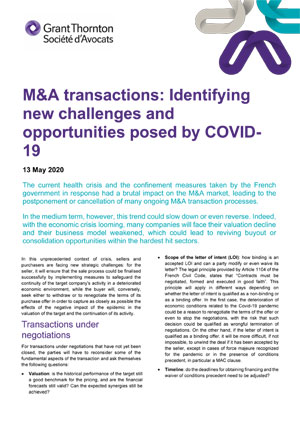-
Tax Policy Management
Tax Policy Management
-
Growth Management
Growth Management
-
Tax audit and litigation
Tax audit and litigation

-
Definition of a strategic and secure transfer pricing structure
Definition of a strategic and secure transfer pricing structure
-
Assistance in the development of international activities and operational reorganisations – “Business restructuring”
Assistance in the development of international activities and operational reorganisations – “Business restructuring”
-
Defense of practices and assistance in the context of tax audits and their follow-up from a litigation viewpoint
Defense of practices and assistance in the context of tax audits and their follow-up from a litigation viewpoint
-
Annual declaration and documentation obligations
Annual declaration and documentation obligations

-
Domestic and international VAT applicable to your company's flow
Domestic and international VAT applicable to your company's flow
-
Banking and financial VAT, VAT in the insurance sector
Banking and financial VAT, VAT in the insurance sector
-
VAT related to real estate registration fees
VAT related to real estate registration fees
-
VAT in the public and non-profit / association sector
VAT in the public and non-profit / association sector
-
Tax audit, tax litigation and relations with the Tax authorities
Tax audit, tax litigation and relations with the Tax authorities
-
Applicable rules for invoicing
Applicable rules for invoicing
-
Customs issues related to your company's international flows
Customs issues related to your company's international flows
-
French VAT registration and compliance obligations
French VAT registration and compliance obligations
-
Payroll tax
Payroll tax
-
Other indirect taxation
Other indirect taxation

-
Company transfer diagnosis
Company transfer diagnosis

-
Distribution strategy : Implementing and structuring
Distribution strategy : Implementing and structuring
-
Distribution activities digitalisation
Distribution activities digitalisation
-
Relations between suppliers and distributors
Relations between suppliers and distributors
-
Contractual policy : etablishing and structuring
Contractual policy : etablishing and structuring
-
Controls and litigation regarding payment terms
Controls and litigation regarding payment terms
-
Organising and securing commercial relations with consumers
Organising and securing commercial relations with consumers
-
Data protection - GDPR
Data protection - GDPR
-
Commercial Leases
Support in the management and contract management of commercial leases.

-
Traditional Services offered
Traditional Services offered
-
Health at work and quality of life at work
Health at work and quality of life at work
-
HR Management Audit
HR Management Audit
-
HR Engineering and People Change
Implementing managerial solutions in line with the company's strategic challenges
-
Management of HR compliance and internal investigations (harassment, discrimination, and whistleblowing)
Management of HR compliance and internal investigations (harassment, discrimination, and whistleblowing)

-
Advice on legal structuring
Advice on legal structuring
-
Day to day company management
Day to day company management
-
Companies reorganisation
Companies reorganisation
-
Mergers & Acquisitions - Private Equity
Mergers & Acquisitions - Private Equity
-
Changes in shareholder structure - Securities issue
Changes in shareholder structure - Securities issue
-
Governance and legal risks management
Governance and legal risks management

-
Development of an international mobility policy
Development of an international mobility policy
-
Coordination of reporting obligations for employees in a mobility situation
Coordination of reporting obligations for employees in a mobility situation
-
Advice on social security
Advice on social security
-
Assistance in labour law
Assistance in labour law

-
Management and protection of your portfolio of property rights
We put the most appropriate protection policy in place for our clients’ intellectual property rights.
-
Securing your projects: advisory and drafting of agreement services
We advise you on the feasibility of your project and the securing of your intellectual property and IT rights.
-
Enforcement of your rights: pre-litigation and litigation
Enforcement of your rights: detection of infringement, pre-litigation and litigation

The current health crisis and the confinement measures taken by the French government in response had a brutal impact on the M&A market, leading to the postponement or cancellation of many ongoing M&A transaction processes.
In the medium term, however, this trend could slow down or even reverse. Indeed, with the economic crisis looming, many companies will face their valuation decline and their business model weakened, which could lead to reviving buyout or consolidation opportunities within the hardest hit sectors.
In this unprecedented context of crisis, sellers and purchasers are facing new strategic challenges: for the seller, it will ensure that the sale process could be finalised successfully by implementing measures to safeguard the continuity of the target company's activity in a deteriorated economic environment, while the buyer will, conversely, seek either to withdraw or to renegotiate the terms of its purchase offer in order to capture as closely as possible the effects of the negative impact of the epidemic in the valuation of the target and the continuation of its activity
Transactions under negotiations
For transactions under negotiations that have not yet been closed, the parties will have to reconsider some of the fundamental aspects of the transaction and ask themselves the following questions:
- Valuation : is the historical performance of the target still a good benchmark for the pricing, and are the financial forecasts still valid? Can the expected synergies still be achieved?
- Scope of the letter of intent (LOI): how binding is an accepted LOI and can a party modify or even waive its letter? The legal principle provided by Article 1104 of the French Civil Code, states that “Contracts must be negotiated, formed and executed in good faith”. This principle will apply in different ways depending on whether the letter of intent is qualified as a non-binding or as a binding offer. In the first case, the deterioration of economic conditions related to the Covid-19 pandemic could be a reason to renegotiate the terms of the offer or even to stop the negotiations, with the risk that such decision could be qualified as wrongful termination of negotiations. On the other hand, if the letter of intent is qualified as a binding offer, it will be more difficult, if not impossible, to unwind the deal if it has been accepted by the seller, except in cases of force majeure recognized for the pandemic or in the presence of conditions precedent, in particular a MAC clause.
- Timeline: do the deadlines for obtaining financing and the waiver of conditions precedent need to be adjusted?
- Guarantees: how to protect against the risk of insolvency of the seller if representations and warranties are invoked or that of the purchaser concerning the payment of the purchase price by the purchaser?
Preparation of the letter of intent
For upcoming M&A transactions, the current exceptional situation will have to be considered by the potential purchaser from the drafting of the letter of intent. The timeline of the transaction will have to include sufficient time for the completion of certain stages of the transaction, such as the due diligence phase and the consultation of the employee representative bodies that are directly impacted by the containment measures taken under the health emergency law. The same applies to the duration of any exclusivity clause. In addition, the purchaser will be advised to provide that the letter of intent will be non-binding, so as to be able to adapt the terms of the letter or withdraw it depending on the extent of the consequences of the Covid-19 epidemic on the target's business.
Due diligence: new points of consideration
Difficulties may also arise when carrying out due diligences, particularly those involving travel to the target's sites (e.g. real estate audit, environmental audit), due to travel restriction measures.
In addition, the economic situation of the target company or the business to be acquired may have changed since the completion of the due diligences by the purchaser due to the health situation. In such cases, additional due diligence work will have to be carried out to assess the effects of the pandemic on the target's business. This will mainly involve verifying that the target is able to continue its activity despite the current unfavourable economic conditions: identification and analysis of the risks related to the target's inability to perform its contractual obligations (review of current commercial contracts, relations with the customers of the target), assessment of the business continuity plans implemented within the target to limit the effects of the epidemic, or the insurance policies in force. Particular attention should also be paid to the target's financial forecasts (turnover, cash flow, EBITDA), which should be updated to take into account any deterioration in the target's results due to the deterioration of the economic environment.
In the same way, these additional due diligences should ensure that the obligations under the financing contracts entered into by the target (covenants), if any, can be met by the target and that the target has requested or is eligible for emergency financing measures (in particular deferral of social security and tax charges, short-time working, State-guaranteed loans).
Finally, the purchaser will have to review insurance, risk coverage contracts and provisions entered into by the target company in light of the current health crisis context in order to determine whether the risks related to the pandemic are covered.
Purchase Prise
In the current crisis context, the purchaser will likely prefer to provide for a price adjustment clause based on verifiable financial criteria (e.g. EBITDA, net debt, turnover) or the implementation of a deferred payment or earn-out mechanism in order to be able to include into the calculation of the purchase price any negative impact in the financial situation of the target after completion of the transaction. Conversely, the seller will likely prefer to rely on the target's historical values and on a locked box mechanism. Hybrid mechanisms may also be used, combining a fixed price and an adjustment clause limited to the interim period or to certain balance sheet criteria only, such as cash flow and working capital requirements.
Regarding the transfer of shares, despite the presence of a fixed price, the price may be renegotiated on the basis of hardship (Article 1195 of the French Civil Code). However, this possibility is excluded for the sale of stocks (Article L. 211-40-1 of the French Monetary and Financial Code).
MAC clause and force majeure clause
A material adverse change clause will allows a party to terminate a transaction (and therefore to renegotiate its terms) in the event of the occurrence of an event having a material adverse effect on the business, financial situation or assets of the target company before the definitive completion of the transaction.
This kind of clause is generally a condition precedent of the purchaser’s commitment. In practice, these clauses are usually limited to events or circumstances intrinsic to the target company and not to external events such as an epidemic. It will therefore be necessary to check on a case-by-case basis whether the effects of an epidemic such as that of Covid-19 are likely to trigger the use of such type of clause, which is a source of uncertainty when the wording of the clause is not sufficiently explicit. For M&A deals under negotiation, it will therefore be recommended that the effects of the current pandemic be expressly included (or excluded) in this type of clause in order to avoid any discussion when it will be invoked.
Force majeure could also be invoked as a cause of impediment to the performance of its obligations by a party to the transaction. Indeed, according to Article 1231-1 of the French Civil Code, force majeure exonerates the debtor’s contractual liability from his non-performance.
In the absence of a contractual definition, the legal notion of force majeure under French jurisprudence traditionally implies that the debtor of the obligation must demonstrate the external, unforeseeable, and irresistible nature of the event constituting the case of force majeure. While it is possible to consider that the conditions of externality and unforeseeability would probably be met in the case of the Covid-19 epidemic for SPA entered into before 12 March 2020, the fulfilment of the condition of irresistibility seems more doubtful, particularly with regard to the obligation of the purchaser to pay the price.
According to the jurisprudence, the mere fact that an obligation is more onerous because of external circumstances does not exonerate the debtor from his obligation to pay on the basis of force majeure. However, the analysis might be different regarding the performance of the obligations of the target company.
Representations and warranties
The Covid-19 pandemic is also likely to have an impact on the representations and warranties given by the seller under the SPA. Many companies have found themselves in difficulty or have seen their business drastically reduced because of the outbreak during the interim period. As a result, the reiteration at closing of the representations and warranties by the seller may, due to the pandemic, prove to be delicate and subject to negotiation with the purchaser, since declarations given at the signing may have become incomplete or inaccurate because of the epidemic. The impact of Covid-19 on the target's business will therefore have to be considered in the determination of the representations and warranties and the possibility of updating them before the closing of the transaction.
Conditions precedent
In the current context, particular attention should also be paid to the effects of the pandemic on the fulfilment of the conditions precedent for the completion of the transaction. For example, the pandemic may affect the purchaser's ability to finance the transaction if they have not yet obtained the financing for the purchase price. It may also result in delays with regulatory approvals due to the reduction of staff or the closure of certain administrations. Obtaining these authorisations generally constitutes a condition precedent.
Unless the beneficiary of the condition precedent waives it or the parties agree to postpone the deadline, the contract will be considered null and void if the conditions are not fulfilled on time. For ongoing negotiations, the parties should therefore ensure that they will provide sufficient time to manage possible delays in the fulfilment of the conditions precedent or provide for the possibility of postponing the deadline.
Management of the interim period
During the period between the signing and the closing, the seller is expected to continue the target's business "in the ordinary course". However, it is possible that the economic situation of the target may face a significant disruption of its business, and, in this case, it may be appropriate to provide for the possibility for the seller to take measures to limit this deterioration.
Signing of the contractual documentation
Given the travel restriction measures that have been implemented by the government, the use of electronic signature under the conditions provided for by the law is an effective alternative to the signature meetings that take place at the time of the signing and the closing.
Author: Marc Huynh, Attorney-at-Law.















